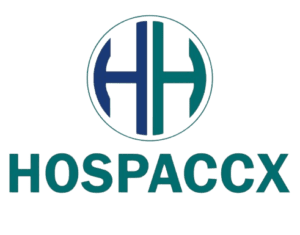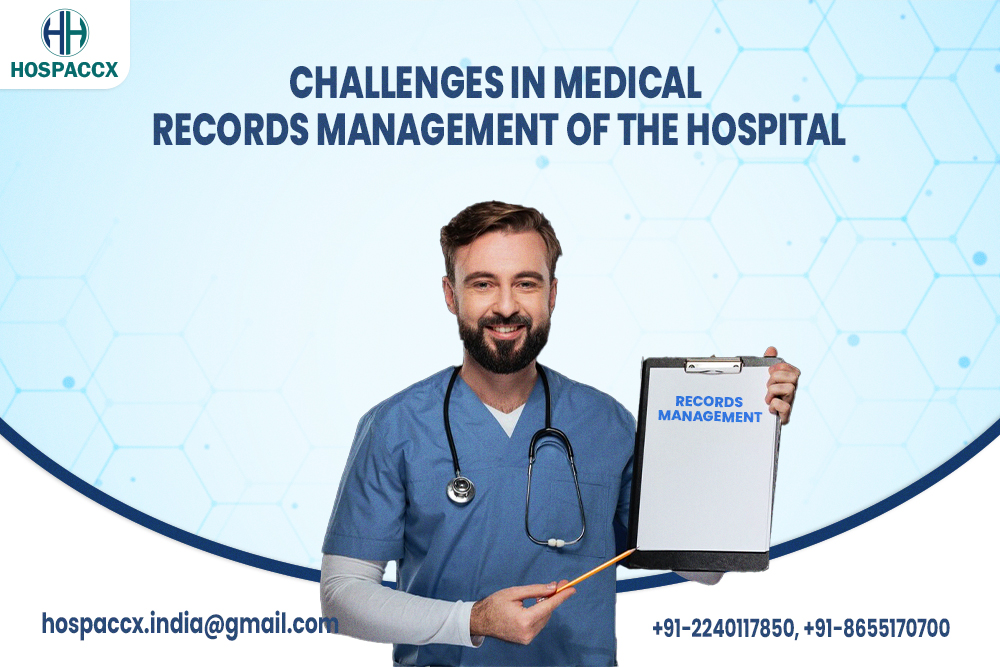Are you aware of common challenges in Medical Records Management of the Hospital? Are you facing any problem in Medical Records Management? In this article, Hospaccx Healthcare Consultancy has listed the challenges faced in Medical Records Management of the Hospital.
INTRODUCTION
Medical Records Management is the art and science of managing all information relating to the operation of a Healthcare Practice. This includes filing and storing Patient Charts, Scanning Medical Records, ensuring adherence to regulations and retention schedules, and managing the destruction of medical records after their retention period. Medical Records Management also involves effective administration of a Practice’s non-Clinical information including accounting records, contracts, and other business-related documentation. Medical Record Storage is a vital concern for Practices, Clinics, and Hospitals of every size. As the requirements for Medical Records Management continue to change, practices need to stay updated on the latest Regulations and ensure that they comply with the latest Records Retention Requirements.
BENEFITS OF MEDICAL RECORDS MANAGEMENT
It is important for medical practices, hospitals, skilled nursing facilities, and long-term care facilities to have a systematic medical records management in place that includes automating, capturing, storing, and disseminating records.
- A systematic management helps in locating and tracking, even for records people don’t frequently use. It can also help to preserve historical and vital information about a medical facility in case of a disaster or legal requirement.
- It makes it easy to transfer or release information between offices – both patients and physicians can access the information promptly without duplicating efforts.
- It increases patient safety, reduce mistakes, and increase confidence in a treatment plan.
- It addresses litigation risks, lower operating costs (due to reduced physical storage needs), and boost employee productivity, mobility, and efficiency.
- Medical records management links to patient management systems, allowing connections between billing and other systems.
LIFE CYCLE OF MEDICAL RECORDS
All the medical records generated have to go through a defined lifecycle from creation or receive, to use, to maintain or protect and to dispose or archive.
TYPES OF MEDICAL RECORDS
Personal Health Record
- Current medications and pharmacy information
- Immunizations
- Allergies
- Health history (including past procedures, surgeries, illnesses, and family history)
- Test and lab results
- Insurance paperwork
- Bills and receipts
Hospital Records
- Admission Register
- Patient case-notes
- Nursing and wards
- x-ray films
- Financial records
- Personnel records
- Patient indexes/records
- Pharmacy/drug records
- Pathological specimen
- Central administrative records
CHALLENGES IN HANDLING OF HEALTH RECORDS IN HOSPITALS
- Inadequate funding as regards record management
- Inadequate supply of computer and other devices for record preservation
- Inadequate skill in computer utilization
- Outdated or non-existence of hardware, software, and network connectivity
- Harsh environmental conditions accelerating record material depreciation
- Lack of preservation and conservation policy
- Inadequate infrastructure to enhance record management
MEASURES OF IMPROVING THE PRESERVATION OF HEALTH RECORDS
- Good handling care of records
- Instant filing and indexing of generated records
- Physical security of records
- Digitization
- Exposure of staff to Computer & skill training
- Computerization
- Refreshing (period from one physical medium to another)
- Regular training of manpower in record management
- Microfilming
TRENDS IS MEDICAL RECORDS MANAGEMENT
Electronic Health Records has the ability to exchange health information electronically to provide higher quality and safer care for patients while creating tangible enhancements for organization. EHRs help providers better manage care for patients and provide better health care by:
- Providing accurate, up-to-date, and complete information about patients at the point of care
- Enabling quick access to patient records for more coordinated, efficient care
- Securely sharing electronic information with patients and other clinicians
- Helping providers more effectively diagnose patients, reduce medical errors, and provide safer care
- Improving patient and provider interaction and communication, as well as health care convenience
- Enabling safer, more reliable prescribing
- Helping promote legible, complete documentation and accurate, streamlined coding and billing
- Enhancing privacy and security of patient data
- Helping providers improve productivity and work-life balance
- Enabling providers to improve efficiency and meet their business goals
- Reducing costs through decreased paperwork, improved safety, reduced duplication of testing, and improved health.
MEDICAL COUNCIL OF INDIA GUIDELINES ON MEDICAL RECORDS
The issue of medical record-keeping has been addressed in the Medical Council of India Regulations 2002 guidelines answering many questions regarding medical records. The important issues that have been addressed are as follows:
- Maintain indoor records in a standard proforma for 3 years from the commencement of treatment (Section 1.3.1 and Appendix 3).
- Requests for medical records by the patient or authorized attendant should be acknowledged and documents issued within 72 hours (Section 1.3.2).
- Maintain a register of certificates with the full details of medical certificates issued with at least one identification mark of the patient and his signature (Section 1.3.3).
- Efforts should be made to computerize medical records for quick retrieval (Section 1.3.4).
CONCLUSION
Management and preservation of health records is an integral part of medical service delivery as it goes a long way in enhancing better service delivery as well as serving as a basis for following patient health trends over time. It also serves as a basis for effecting referral service. Hence effort should be made to ensure regular preservation and management of hospital records.
The knowledge and skill of hospital record management and preservation should be incorporated into the hospital staff through training and re-training, formulation of record management policies, infrastructural development, proper funding, computer skill training, etc as these would help in ameliorating the problem of poor hospital record preservation and management and its attendant’s negative impact on health care delivery.
Are you looking for a consultant to advise you for efficient Medical Records Management of the Hospital? We can help you to tackle the challenges faced in Medical Records Management of the Hospital.
If you need any support, you can contact us: Hospaccx healthcare business consulting Pvt. Ltd you can visit our website https://hospaccxconsulting.com/
Related Team Members
























